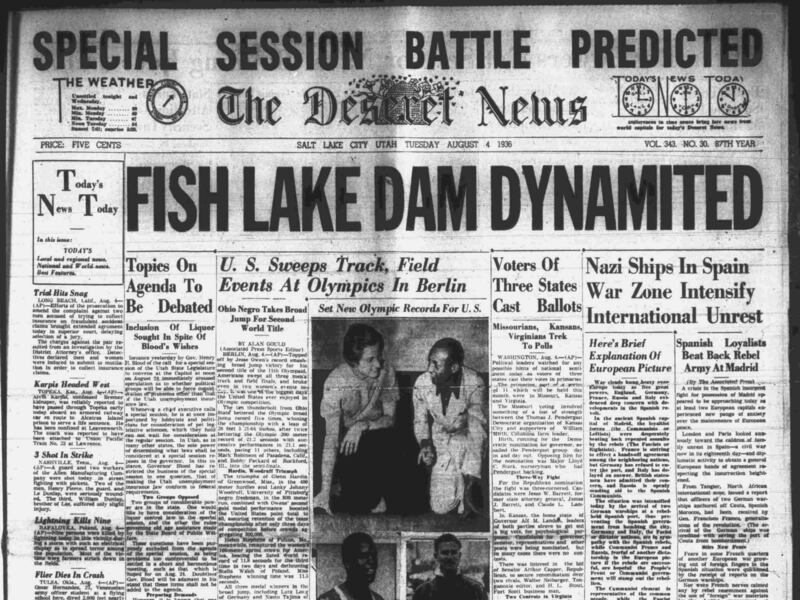Sports
Jesse Owens Triumphs at 1936 Berlin Olympics, Defying Hitler’s Ideology

On August 3, 1936, American athlete Jesse Owens made history by winning the first of his four gold medals at the Berlin Olympics, dominating the 100-meter sprint. His extraordinary performance not only secured his place in the annals of sports but also challenged the prevailing notions of racial superiority espoused by Nazi Germany. This remarkable achievement occurred against the backdrop of a regime that sought to showcase Aryan dominance through the Games.
Owens, who had already achieved considerable fame prior to the Olympics, solidified his status as one of the greatest track and field athletes of all time. He had previously set three world records and tied another within a remarkable span of just 45 minutes at the 1935 Big Ten Conference track meet. In Berlin, he continued to excel, winning gold in the long jump and 200 meters, and contributing to the U.S. team’s victory in the 4×100-meter relay.
Historians often credit Owens with “single-handedly crushing Hitler’s myth of Aryan supremacy.” His success, alongside teammates such as Ralph Metcalfe, Archie Williams, John Woodruff, and Cornelius Johnson, resulted in the U.S. track and field team winning a total of 12 gold medals at these Games. The impact of Owens’ victories resonated far beyond the realm of sports, symbolizing the resilience and determination of those who challenged discrimination and prejudice.
Adolf Hitler, who was present at the Games, reportedly reacted with anger to Owens’ triumphs, as they directly contradicted the narrative he sought to promote. This clash of ideologies occurred just three years before the onset of World War II, marking a pivotal moment in history.
Owens’ legacy continued long after his passing in 1980. Today, USA Track and Field honors his contributions by awarding the Jesse Owens Award annually to the sport’s top athlete. The reverberations of his achievements are still felt, as they inspire new generations to break barriers and pursue excellence in athletics.
In 2024, the spotlight turned once again to Owens and his accomplishments, with various media outlets revisiting his story. Articles from Deseret News archives highlight significant moments from his career, including pieces titled “Jesse Owens to be honored in Berlin,” “Panel opens exhibit on 1936 Olympics,” and “Jesse Owens’ 1936 Olympic medal up for auction.” These retrospectives underscore the enduring significance of his journey and the historical context surrounding the 1936 Olympics.
Owens’ story is not just one of athletic prowess but also a testament to the power of perseverance in the face of adversity. His victories in Berlin remain a powerful reminder of the ongoing struggle against racism and discrimination in sports and society at large.
-

 Lifestyle3 months ago
Lifestyle3 months agoLibraries Challenge Rising E-Book Costs Amid Growing Demand
-

 Sports3 months ago
Sports3 months agoTyreek Hill Responds to Tua Tagovailoa’s Comments on Team Dynamics
-

 Sports3 months ago
Sports3 months agoLiverpool Secures Agreement to Sign Young Striker Will Wright
-

 Lifestyle3 months ago
Lifestyle3 months agoSave Your Split Tomatoes: Expert Tips for Gardeners
-

 Lifestyle3 months ago
Lifestyle3 months agoPrincess Beatrice’s Daughter Athena Joins Siblings at London Parade
-

 World3 months ago
World3 months agoWinter Storms Lash New South Wales with Snow, Flood Risks
-

 Science3 months ago
Science3 months agoTrump Administration Moves to Repeal Key Climate Regulation
-

 Science2 months ago
Science2 months agoSan Francisco Hosts Unique Contest to Identify “Performative Males”
-

 Business3 months ago
Business3 months agoSoFi Technologies Shares Slip 2% Following Insider Stock Sale
-

 Science3 months ago
Science3 months agoNew Tool Reveals Link Between Horse Coat Condition and Parasites
-

 Sports3 months ago
Sports3 months agoElon Musk Sculpture Travels From Utah to Yosemite National Park
-

 Science3 months ago
Science3 months agoNew Study Confirms Humans Transported Stonehenge Bluestones









